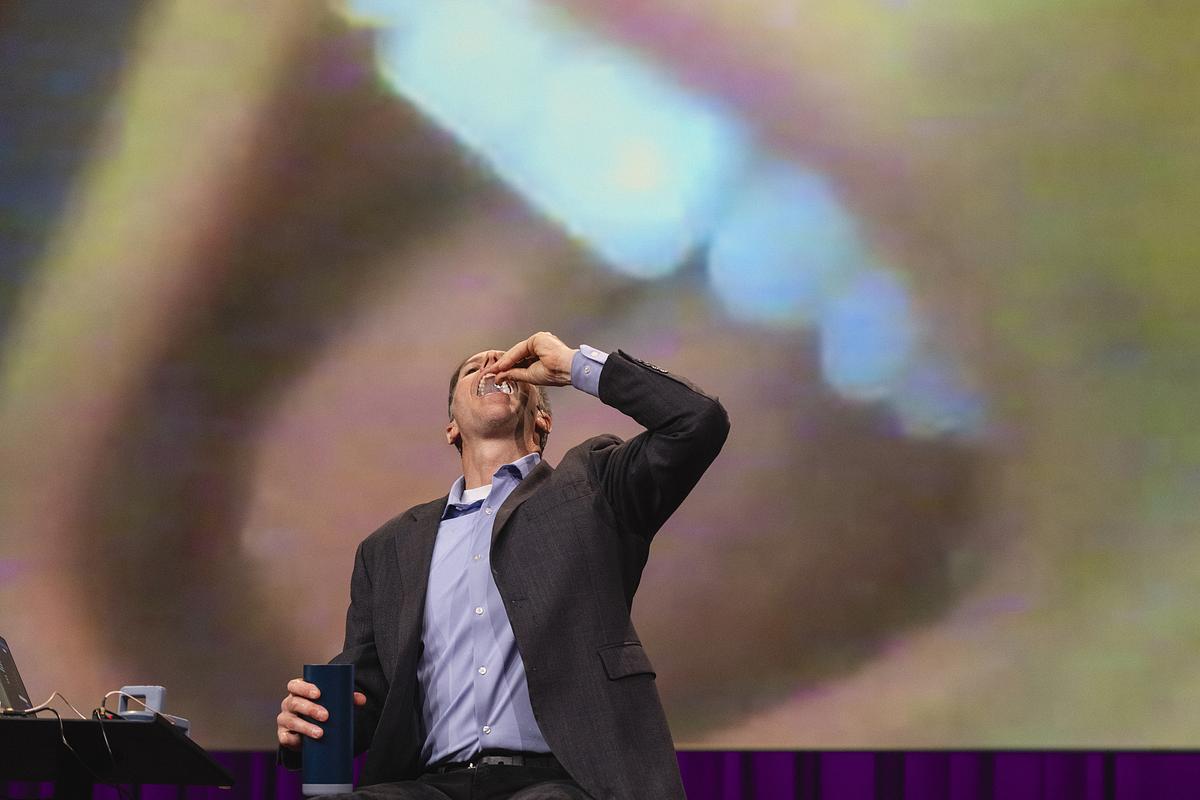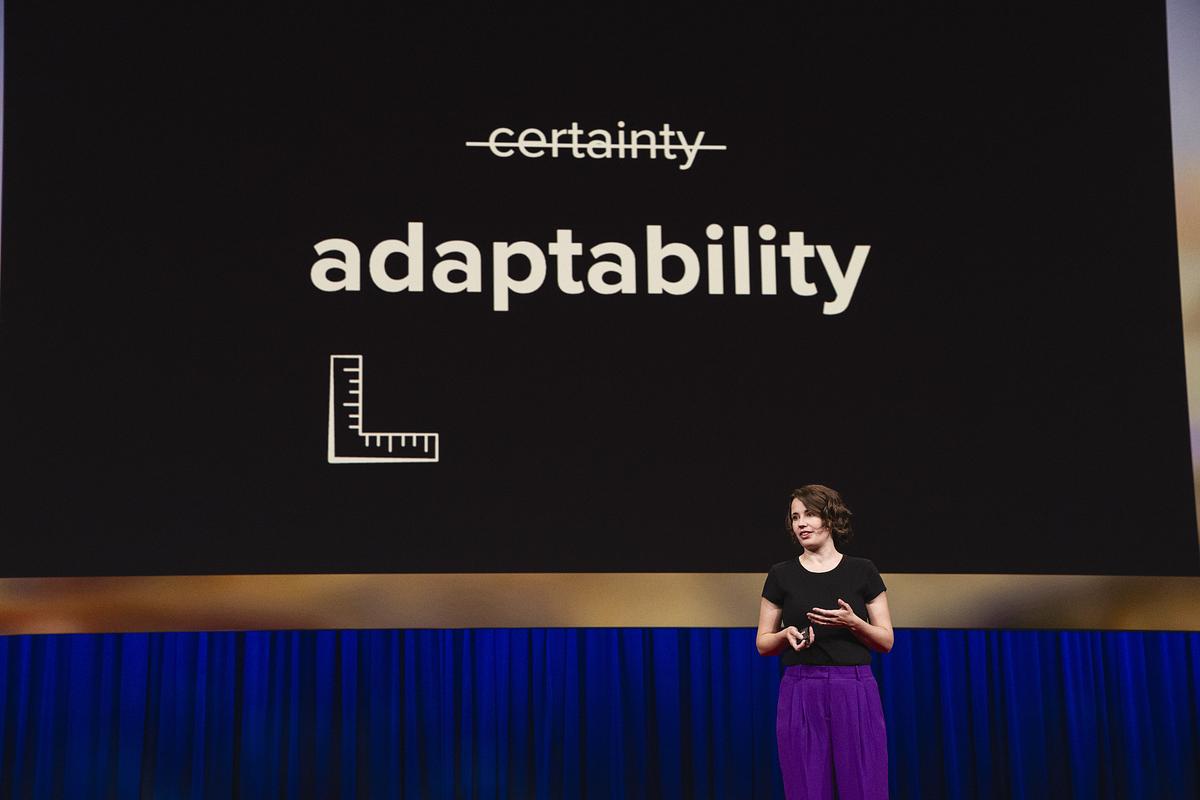
Head of TED Chris Anderson and host of The TED AI Show Bilawal Sidhu speak at Session 2 of TED2024: The Brave and the Brilliant, on Tuesday, April 16, 2024 in Vancouver, BC, Canada. (Photo: Gilberto Tadday / TED)
AI is reshaping how we interact with the world around us and within us, expanding creative possibilities and bringing us closer together by dissolving barriers of all kinds. But anyone who’s paying attention can spot its obvious flaws and potential pitfalls.
From trailblazing platforms making software accessible to micro-robotics revolutionizing health care (including a mind-blowing demo you won’t want to miss), Session 2 of TED2024 explored the frontiers of tech with visionary entrepreneurs, scientists and creators. They offered glimpses of what good AI could do for the world when governed with empathy and curiosity.
The event: Talks from Session 2 of TED2024: The Brave and the Brilliant, hosted by head of TED Chris Anderson and creative technologist and host of The TED AI Show Bilawal Sidhu
When and where: Tuesday, April 16, 2024, at the Vancouver Convention Centre in Vancouver, BC, Canada
Speakers: Vinod Khosla, Fei-Fei Li, Thomas Dohmke, Niceaunties, Alex Luebke, Vivek Kumbhari, Helen Toner
A special challenge: President and CEO of the Bezos Earth Fund Andrew Steer announces the AI for Climate and Nature Grand Challenge, a groundbreaking initiative set to distribute up to $100 million in grants to harness AI in the fight against climate change and nature loss.
The talks in brief:

Investing legend Vinod Khosla speaks at Session 2 of TED2024: The Brave and the Brilliant, on Tuesday, April 16, 2024 in Vancouver, BC, Canada. (Photo: Jason Redmond / TED)
Vinod Khosla is a self-proclaimed techno-optimist who believes in the power of “foolish ideas.” He shares his predictions for how technology will continue improving human lives, discussing expanded medical care through AI doctors, a massive robotic workforce, planes that can travel 4,000 miles per hour and more.

AI pioneer Fei-Fei Li speaks at Session 2 of TED2024: The Brave and the Brilliant, on Tuesday, April 16, 2024 in Vancouver, BC, Canada. (Photo: Jason Redmond / TED)
AI pioneer Fei-Fei Li proposes that the progress of AI’s understanding of spatial intelligence – the ability to derive predictions and insight from objects’ relationships to one another – is catalyzing robotic learning, bringing us closer to a world where AI not only sees and creates but also interacts with the world around us.

GitHub CEO Thomas Dohmke speaks at Session 2 of TED2024: The Brave and the Brilliant, on Tuesday, April 16, 2024 in Vancouver, BC, Canada. (Photo: Gilberto Tadday / TED)
Software development has long been the purview of specialized workers. By removing the barrier between programming languages and human ones, GitHub CEO Thomas Dohmke shows how AI is poised to change that forever. He demos never-before-seen software his team has been developing that promises to empower people to create code using just their spoken words — in any language.

Artist Niceaunties speaks at Session 2 of TED2024: The Brave and the Brilliant, on Tuesday, April 16, 2024 in Vancouver, BC, Canada. (Photo: Gilberto Tadday / TED)
From sushi-bedecked cars with legs to elderly women wearing cat-shaped masks made of cereal, artist Niceaunties’ surreal “Auntieverse” — a mind-bending homage to “auntie culture” prevalent in Asian communities — charmingly showcases the creative potential of human-AI partnerships.

Engineer and entrepreneur Alex Luebke swallows PillBot in a mind-blowing demo at Session 2 of TED2024: The Brave and the Brilliant, on Tuesday, April 16, 2024 in Vancouver, BC, Canada. (Photo: Jason Redmond / TED)
Meet PillBot: a wireless micro-robot that can go inside the human body and take a look around. In a (literally) stomach-turning demo, engineer and entrepreneur Alex Luebke swallows a PillBot and physician-scientist Vivek Kumbhari navigates it around his stomach with a game controller, showing how the device allows direct visualization of internal organs and could move us past the age of invasive, expensive endoscopies.

AI policy expert Helen Toner speaks at Session 2 of TED2024: The Brave and the Brilliant, on Tuesday, April 16, 2024 in Vancouver, BC, Canada. (Photo: Gilberto Tadday / TED)
No one understands AI — not even experts, says policy expert Helen Toner. But that doesn’t mean we can’t govern it. She makes the case that people and policymakers need to push for more research into AI interpretability (measuring what these systems can do) as well as regulations that require AI companies to share what they’re building and why.

The audience in the TED Theater during Session 2 of TED2024: The Brave and the Brilliant, on Tuesday, April 16, 2024 in Vancouver, BC, Canada. (Photo: Ryan Lash / TED)
TED2024, held April 15-19, 2024, in Vancouver, BC, Canada, is a week of talks, discovery sessions, excursions, dinners, performances and more celebrating “The Brave and the Brilliant.” Special thanks to our strategic partners PwC, Adobe, Schneider Electric and Northwestern Mutual.